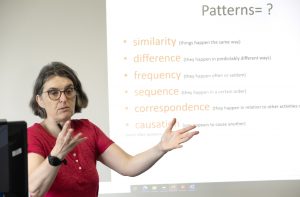Please note: This course will be delivered in person at the Colchester campus. Online study is not available for this course.

Lea Sgier spends part of her time teaching qualitative methods and doing research at the Department of Political Science of the University of Geneva (Switzerland). In the remaining time, she works as an independent research methods and research ethics consultant (currently for various European and Swiss research projects; LISER in Luxemburg, and for the evaluation company Evalux). She is also an instructor for a number of graduate programmes across the world (Essex SS, Hong Kong SS, Concordia University (Montreal) Methods Workshops, ENS (Paris), EPFL and CUSO Programmes in Switzerland etc.). She has also worked in capacity building functions (for LISER in Luxemburg and in international research cooperation with the Western Balkans and the South Caucasus). From 2010-17, she was an assistant professor in qualitative methodology at (US accredited) Central European University (CEU) in Budapest.
Research wise, she has just completed a project (with Barbara Lucas, HETS Genève; Leenaards Foundation 2017-21) on institutionalised elderly people’s relation to politics and voting in French-speaking Switzerland, a project that involved small-scale ethnographic observation, qualitative interviews, an institutional survey and a legal analysis. Previously, she worked on gender issues in politics and on comparative old age and dementia policy.


Course Content
This is a course centred mainly on the analysis of textual data in an interpretive spirit. The main emphasis is on exploring various approaches to qualitative data analysis and interpretation, from thematic analysis and the logic of formalized “coding”, to interpretative approaches such as discourse and narrative analysis. We will discuss how each of these methods reveals different aspects of the data and is grounded in different research perspectives. We will review the nature, strengths and limits of various approaches and get acquainted with their practicalities through a series of practical exercises. We will also explore the implications of various types of analysis on the data generation stage, for qualitative interviewing in particular, and reflect upon issues such as appropriate topic guides, interviewing techniques and transcription practices. (This is not a full course on interviewing though, only the aspects directly connected to the data analysis stage will be discussed).
Particular attention will also be given to the writing-up stage of qualitative analysis and its difficulties. Other topics to be addressed are the epistemological foundations of qualitative research, validity and reliability issues, as well as issues of interpretative authority and research ethics.
The course consists of lectures and practical exercises. Participants will be invited to hand in various pieces of data analysis in the course of the two weeks. They will have the opportunity to work on their own data if they wish.
Course Objectives
The aim of this course is to familiarize participants with the practical application of qualitative data analysis, with an emphasis on interpretative methods. At the end of the course, participants will understand the implications of applying various methods to textual and interview data. Ultimately, the goal is to achieve a more sophisticated and critical attitude towards data, the research process and research reports.
This is not an introductory course to qualitative methodology in general, but a doctoral-level course that focuses mostly on (textual) data analysis. It is suitable mainly for two types of participants: participants already engaged in research requiring textual analysis who are moving towards the data analysis stage and need to acquire some analytical tools for this; and participants at earlier stages of their research who wish to gain a general understanding of various approaches to textual analysis.
Course Prerequisites
Some experience with qualitative research (data collection, data analysis, epistemology) would be helpful.
Remedial Reading
Coffey, A. and Atkinson, P. 1996. Making Sense of Qualitative Data. Sage.
Ritchie, J. et al. (eds) 2014. Qualitative Research Practice. A Guide for Social Scienists and Researchers. London: Sage (ch. 1, 10-13).
Miles, M. Huberman, A. M. and Saldaña, J. 2014. Qualitative Data Analysis. A Methods Sourcebook, 3rd edition. Thousand Oaks: Sage (ch. 4, 6, 7).
Representative Background Reading
Butcher, H. K. et al. (2001). Thematic Analysis in the Experience of Making a Decision to Place a Family Member With Alzheimer’s Disease in a Special Care Unit. Research in Nursing&Health 24: 470-80.
Tryandafyllidou, A. (2008). Popular Perceptions of Europe and the Nation: the Case of Italy. Nations and Nationalism 14(2): 261-282.
Wetherell, M., Taylor, S. and Yates, S. G. (eds) 2001. Discourse as Data. A Guide for Analysis. London: Sage
Day 1: Introduction – Introduction to the course – the nature and difficulties of qualitative research – interpretive qualitative research – introduction to qualitative data analysis
Readings (1) Maxwell, Joseph A. and Chmiel, Margaret (2014). “Notes Toward a Theory of Qualitative Data Analysis”, in Flick, Uwe (ed.), The Sage Handbook of Qualitative Data Analysis, London: Sage, pp. 21-34. (2) Pahl, J.M. and Pahl, R.E. (1971). Managers and their Wives. A Study of Career and Family Relationships in the Middle Class. Harmonsworth: Penguin, pp. 1-16.
Supplementary readings Flick, Uwe (2014). “Mapping the Field”, in Flick, Uwe (ed.), The Sage Handbook of Qualitative Data Analysis, London: Sage, pp. 3-18. Tryandafyllidou, Anna (2008). “Popular Perceptions of Europe and the Nation: the Case of Italy”. Nations and Nationalism 14(2): 261-282
Day 2: Thematic analysis (1) – introduction to thematic analysis – the analytical process and the logic of coding – main problems in qualitative content analysis – inductive and deductive strategies – exercises
Readings (3) Braun, Virginia and Clarke, Victoria (2006). “Using Thematic Analysis in Psychology”, Qualitative Research in Psychology 3(2): 77-101. (4) Ritchie, Jane and Spencer, Liz (2002). “Qualitative Data Analysis for Applied Policy Research”, in Huberman, A. Michael and Miles, Matthew B. (eds), The Qualitative Research Companion. Thousand Oaks: Sage, pp. 305-329. (5) Pahl, J.M. and Pahl, R.E. (1971). Managers and their Wives. A Study of Career and Family Relationships in the Middle Class. Harmonsworth: Penguin, pp. 108-139.
Supplementary readings Mayring, Philipp (2000). Qualitative Content Analysis [28 paragraphs]. Forum Qualitative Sozialforschung / Forum: Qualitative Social Research, 1(2), Art. 20, http://nbn-resolving.de/urn:nbn:de:0114-fqs0002204.
Day 3: Thematic analysis (2) – first and second cycle coding methods – cross- and within-case analysis – exercises (continued)
Readings (6) Bazeley, Patricia (2009). “Analysing Qualitative Data: More Than Identifying Themes”. Malaysian Journal of Qualitative Research 2(2): 6-22. (http://www.researchsupport.com.au/Bazeley_MJQR_2009.pdf) (7) Riessman, Catherine Kohler (2008). Narrative Methods for the Human Sciences. London: Sage, ch. 3 (“Thematic analysis”). (8) Pahl, J.M. and Pahl, R.E. (1971). Managers and their Wives. A Study of Career and Family Relationships in the Middle Class. Harmonsworth: Penguin, pp. 78-104. (9) Fereday, Jennifer and Muir-Cochrane, Eimear (2006). “Demonstrating Rigor Using Thematic Analysis: A Hybrid Approach of Inductive and Deductive Coding and Theme Development”. International Journal of Qualitative Methods. 5(1). 80-92.
Supplementary readings *Palmberger, Monika and Gingrich, Andre (2014). “Qualitative Comparative Practices: Dimensions, Cases and Strategies”, in in Flick, Uwe (ed.), The Sage Handbook of Qualitative Data Analysis, London: Sage, pp. 94-108.
Day 4: Thematic analysis (3): – from theory to analysis – the logic of sensitising concepts – from analysis to theorising – moving beyond data – CAQDAS assisted coding – exercises (continued) (10) Pahl, J.M. and Pahl, R.E. (1971). Managers and their Wives. A Study of Career and Family Relationships in the Middle Class. Harmonsworth: Penguin, pp.198-206, 237-268, (279-306). (11) Butcher, Howard Karl et al. (2001). “Thematic Analysis in the Experience of Making a Decision to Place a Family Member With Alzheimer’s Disease in a Special Care Unit”. Research in Nursing&Health 24: 470-80. (12) Miles, Matthew B., Huberman, A. Michael and Saldaña, Johnny (2014).Qualitative Data Analysis: A Methods Sourcebook. Thousand Oaks: Sage, ch. 4. (13) Blumer, Herbert (1931). “Science Without Concepts”. American Journal of Sociology 36(4): 515-533.
Supplementary readings Bowen, Glenn A. 2006. “Grounded Theory and Sensitizing Concepts.” International Journal of Qualitative Methods 5(3), article 2. Retrieved on September 5 from http://www.ualberta.ca/~ijqm/backissues/5_3/pdf/bowen.pdf Carreri, Anna (2014). “Fatherhood and precarious work: a supporting relation between systems of meaning”. About Gender: International Journal of Gender Studies 3(6): 87-114. *Miles, Matthew B., Huberman, A. Michael and Saldaña, Johnny (2014).Qualitative Data Analysis: A Methods Sourcebook. Thousand Oaks: Sage, ch. 8-9 (recommended reading for those who undertake some form of explanatory research). Silver, Christina and Lewins, Ann F. (2014). “Computer-Assisted Analysis of Qualitative Research”, in Leavy, Patricia (ed.), The Oxford Handbook of Qualitative Research, Oxford/New York: Oxford University Press, pp. 606-638. *Steenbergen, Marco R.; Bächtiger, André; Spörndli, Markus and Steiner, Jürg (2003). “Measuring Political Deliberation: a Discourse Analysis”. Comparative European Politics 2003/1: 21-48.
Day 5: From thematic to interpretive analysis – from contents to constructions of meaning – introduction to interpretive analysis: logic and theoretical underpinnings
Readings (14) Bacchi, Carol. “Why Study Problematizations? Making Politics Visible.” Open Journal of Political Science 2.01 (2012): 1-8. (15) Bevir, Mark and Rhodes, R.A.W. (2006). “Defending Interpretation”. European Political Science EPS 5/2006: 69-83. (16) Geertz, Clifford (1987). “Deep Play: Notes on the Balinese Cockfight”, in Rabinow, Paul and Sullivan, William M. (eds), Interpretive Social Science: A Second Look. Berkeley: University of CaliforniaPress, pp. 195-240.
Supplementary readings *Phillips, Louise et Jorgensen, Marianne W. (2002). Discourse Analysis as Theory and Method. London: Sage, ch. 6 (“Social constructionist approach”). Riessman, Catherine Kohler (1990). Divorce Talk. Women and Men Make Sense of Personal Relationships. New Brunswick : Rutgers University Press, pp. 21-73 and 221-230.
Friday 18:00: deadline for the Intermediate Assignment!
Weekend
Day 6: Discourse analysis (1) – analysing systems of meaning
Readings Readings (17) Gill, Rosalind (2000). “Discourse Analysis”, in Bauer, M. and Gaskell, G., Qualitative Researching with Text, Image and Sound. London: Sage, pp. 172-190. (18) Milliken, Jennifer (1999). “The Study of Discourse in International Relations: A Critique of Research and Methods”. European Journal of International Relations 5:225-254. DOI 10.1177/1354066199005002003 (19) Mills, Sara (2004). Discourse. New York : Routledge, pp. 26-42.
Supplementary readings *Bacchi, Carol (2009). “The Issue of Intentionality in Frame Theory”, in Lombardo, Emanuela, Meier, Petra and Verloo, Mieke (eds). The Discursive Politics of Gender Equality. London/New York: Routledge: pp. 19-35 Howarth, David (2000). Discourse. Buckingham: Open University Press. Schram, Sanford (2012). “The Deep Semiotic Structure of Deservingness. Discourse and Identity in Welfare Policy”, in Fischer, Frank and Gottweis, Herbert (eds). The Argumentative Turn Revisited. Public Policy as Communicative Practice. Durham/London: Duke University Press, pp. 236-268. Taylor, Stephanie (2001). “Locating and Conducting Discourse Analytic Research”, in Wetherell, Margaret., Taylor, Stephanie and Yates, Simeon J. (Eds). Discourse as Data. A Guide for Analysis. London: Sage, pp. 5-48. Torfing, Jacob (2005). “Introduction: Discourse Theory: Achievements, Arguments and Challenges”, in Howarth, David and Torfing, Jakob (eds) (2005). Discourse Theory in European Politics. Identity, Policy and Governance. Houndmills: Palgrave, pp. 1-28.
Day 7: Discourse analysis (2) – critical frame analysis – the methodology of interpretive analysis – the limits of interpretive analysis
Readings (20) Verloo, Mieke (2005). “Mainstreaming Gender Equality in Europe. A Critical Frame Analysis”. The Greek Review of Social Research 117 B’: 11-34. (21) Meier, Petra (2008). “Critical Frame Analysis of EU Gender Equality Policies: New Perspectives on the Substantive Representation of Women”. Representation 44(2): 155-167. (22) Bacchi, Carol (2000). “Policy as Discourse: What Does it Mean? Where Does it Get Us?.” Discourse 21.1 (2000): 45-57.
Supplementary readings Antaki, Charles, Billig, Michael, Edwards, Derek and Potter, Jonathan (2003). “Discourse Analysis Means Doing Analysis: A Critique of Six Analytic Shortcomings”. Discourse Analysis Online 1(1). [http://www.shu.ac.uk/daol/previous/v1/n1/index.htm] Denzin, Norman K. (2002). “The Interpretive Process”, in Huberman, A. Michael and Miles, Matthew B. (eds), The Qualitative Research Companion. Thousand Oaks: Sage pp. 349-366. Gee, James Paul (1999). An Introduction to Discourse Analysis. Theory and Method. New York/London: Routledge, pp. 148-163. Hall, Stuart (1997). “The Spectacle of the ‘Other’”, in Hall, Stuart (ed.). Representation. Cultural Representations and Signifying Practices. Milton Keynes: Open University Press, pp. 13-74. Snow, David A. (2007). “Framing Processes, Ideology, and Discursive Fields”, in Snow, David, Soule, Sarah A. and Kriesi, Hanspeter (eds), The Blackwell Companion to Social Movements. Cambridge: Polity, pp. 380-412.
Day 8: Discourse analysis (3) – Beyond constructions of meaning (genealogical analysis, processes of production and reception, discourse and institutional change, etc.) – Collecting/generating data for interpretive purposes – Sampling in qualitative research
Readings (23) Lucas, Barbara (2004). “Reducing Discursive Complexity : the Case of Alcohol Policies in Europe (1850-2000)”, in Muller, Richard and Klingemann, Harald (eds). From Science to Action? 100 Years Later – Alcohol Policies Revisited. Dordrecht: Kluwer. (24) Hart, Bethne; Sainsbury, Peter and Short, Stephanie (1998). “Whose Dying? A Sociological Critique of the ‘Good Death’”. Mortality 3(1): 65-77. (25) Hermanowicz, Joseph C. (2002). “The Great Interview: 25 Strategies for Studying People in Bed”, Qualitative Sociology 25(4): 479-499. (26) Luborsky, Mark R. and Rubinstein, Robert L. (1995). “Sampling in Qualitative Research: Rationale, Issues, and Methods”. Research on Aging 17:89-113
Supplementary readings Cohen, Laurie and Mallon, Mary (2001). “My brilliant career? Using stories as a methodological tool in career research”. International Studies of Management and Organisation 31(3): 48-68. Howarth, David (2005). “Applying Discourse Theory: the Method of Articulation”, in Howarth, David and Torfing, Jakob (eds) (2005). Discourse Theory in European Politics. Identity, Policy and Governance. Houndmills: Palgrave, pp. 316-349. Phillips, Louise and Jorgensen, Marianne W. (2004). Discourse Analysis as Theory and Method. London: Sage, ch. 5 (pp. 138-174). *Panizza, Francisco and Miorelli, Romina (2013). “Taking Discourse Seriously: Discursive Institutionalism and Post-structuralist Discourse Theory”. Political Studies 61: 301-318. Plummer, Ken (1995). Telling Sexual Stories. Power, Change and Social Worlds. London: Sage (ch. 2, 3). Rapley, Tim (2014). “Sampling Strategies in Qualitative Research”, in Flick, Uwe (ed.), The Sage Handbook of Qualitative Data Analysis, London: Sage, pp. 49-63. *Ritchie, Jane, Lewis, Jane and Elam, Gilian (2003). “Designing and Selection Samples”, in Ritchie, Jane and Lewis, Jane (eds), Qualitative Research Practice. London: Sage, ch. 4. Tamboukou, Maria (2009). “A Foucauldian Approach to Narratives”, in Andrews, Molly, Squire, Corinne and Tamboukou, Maria (eds). Doing Narrative Research. London: Sage, pp. 102-120. Wetherell, Margaret (2001), “Debates in Discourse Research”, in Wetherell, Margaret, Taylor, Stephanie and Yates, Simeon, J. (eds), Discourse Theory and Practice. A Reader. London: Sage, pp. 380-399.
Day 9: Ethical, Epistemological and Practical Issues in Qualitative Analysis – quality criteria in qualitative research – interpretive authority and epistemology – ethics, power and methodology – writing up
Readings (27) Yanow, Dvora (2006). “Neither Rigorous nor Objective? Interrogating Criteria for Knowledge Claims in Interpretive Science”, in Yanow, Dvora and Schwartz-Sea, Peregrine (eds) (2006). Interpretation and Method. Empirical Research Methods and the Interpretive Turn. Armonk NY: M.E. Sharpe. (28) Hammersley, Martyn (2008). “Troubles with Triangulation”, in Bergman, Manfred Max ed. Advances in Mixed Methods Research. London: Sage, pp. 22–36. (29) Borland, Katherine (2004). “ ‘That is Not What I Said’. Interpretive Conflict in Oral Narrative Research”, in Hesse-Biber, S.N. et Leavy, P. (eds), Approaches to Qualitative Research. Oxford: Oxford University Press, pp. 522-534. (30) Schofield, Janet Ward (2002). “Increasing the Generalizability of Qualitative Research”, in Huberman, A. Michael and Miles, Matthew B. (eds). The Qualitative Researcher’s Companion. Thousand Oaks: Sage, pp. 171-204.
Supplementary readings American Sociological Association ASA, Code of Ethics. *Becker, Howard S. (1976). “Whose Side Are We On?”. Social Problems 14(3): 239-247. *Guba, Egon and Lincoln, Yvonna (2005). “Paradigmatic Controversies, Contradictions, and Emerging Cofluences”, in Denzin, N. and Lincoln, Y. (eds), Handbook of Qualitative Research, 3rd edition. Thousand Oaks: Sage, pp. 191-215. *Kriesi, Hanspeter (1992). “The Rebellion of the Research ‘Objects’”, in Diani, Mario and Eyerman, Ron (eds), Studying Collective Action. London: Sage, pp. 194-216. *Lilleker, Darren (2003). “Interviewing the Political Elite: Navigating a Political Minefield”, Politics 23(3): 207-14. Maxwell, Joseph A. (2002). “Understanding and Validity in Qualitative Research”, in Huberman, A. Michael and Miles, Matthew B. (eds), The Qualitative Research Companion. Thousand Oaks: Sage, pp. 37-64. Mertens, Donna M. (2014). “Ethical Use of Qualitative Data and Findings”, in Flick, Uwe (ed.), The Sage Handbook of Qualitative Data Analysis, London: Sage, pp. 510-523. Ostrander, Susan A. (1993). “’Surely You’re Not in This Just To Be Helpful’ : Access, Rapport, and Interviews in Three Studies of Elites.” Journal of Contemporary Ethnography 22: 7-27. Ritchie, Jane and Lewis, Jane (2003). “Generalising from Qualitative Research”, in Ritchie, Jane and Lewis, Jane (eds), Qualitative Research Practice. London: Sage, pp. 263-286 (ch. 10). Swiss Academy for Humanities and Social Sciences (undated). Qualitative Research Methods Statement.
Thursday 18:00 Deadline for the Final Assignment!
Day 10 Writing Up – a critical look at academic writing – balancing description, analysis and interpretation – ethical issues in writing up – managing the writing process – writing for sceptical audiences
Readings (31) Becker, Howard S. (1986). Writing for Social Scientists. How to Start and Finish your Thesis, Book, or Article. Chicago: The University of Chicago Press, ch. 2 and 4. (32) Reid, Natalie (2010). Getting published in international journals: writing strategies for European social scientists. Oslo: NOVA – Norwegian Social Research, pp. 142-157, 184-198 (33) White, Clarissa, Woodfield, Kandy and Ritchie, Jane (2003). “Reporting and Presenting Qualitative Data”, in Ritchie, Jane et Lewis, Jane (éds), Qualitative Research Practice. London: Sage, ch. 11. (34) Pinker, Steven (2014). “Why Academics Stink at Writing”. The Chronicle Review 26 September 2014.
Supplementary readings Murray, Rowena (2005b). Writing for Academic Journals. Maidenhead UK : Open University Press. Van Maanen, John (2011). Tales Of The Field. On Writing Ethnography. Chicago: University of Chicago Press, 2nd edition. Wolcott, Harry F. (1994). “Description, Analysis, and Interpretation in Qualitative Inquiry”, in Wolcott, Harry F., Transforming Qualitative Data. Description, Analysis, Interpretation. Thousand Oaks: Sage, pp. 9-54.





